


2019 Passat Variant (B8, facelift 2019)
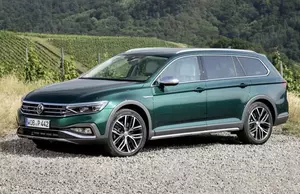
2019 Passat Alltrack (B8, facelift 2019)
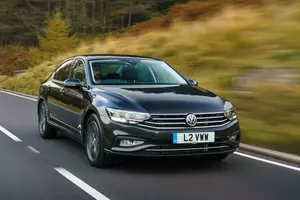
2019 Passat (B8, facelift 2019)
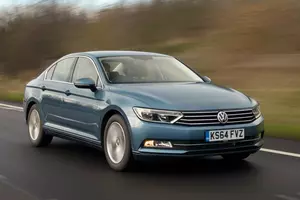
2015 Passat (B8)
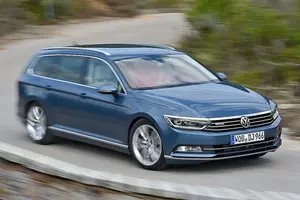
2015 Passat Variant (B8)
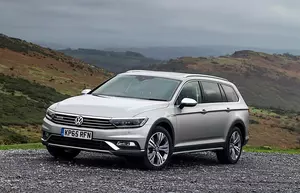
2015 Passat Alltrack (B8)
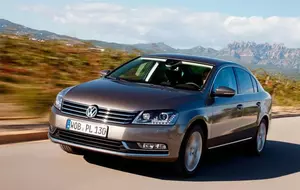
2010 Passat (B7)
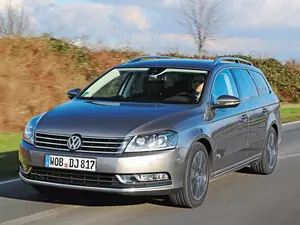
2010 Passat Variant (B7)
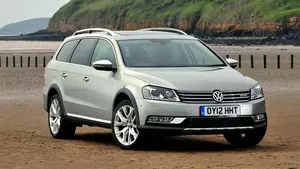
2010 Passat Alltrack (B7)
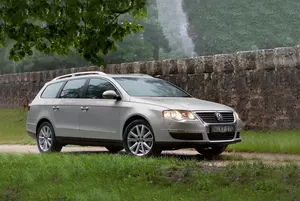
2005 Passat Variant (B6)
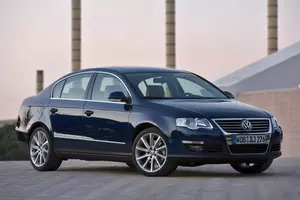
2005 Passat (B6)
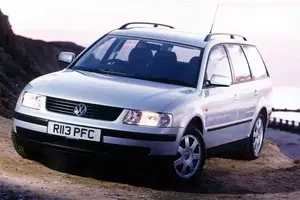
1997 Passat Variant (B5)
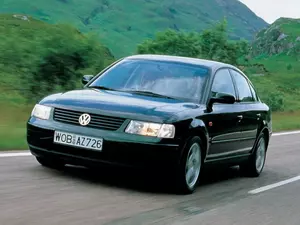
1996 Passat (B5)

1988 Passat (B3, B4)

1988 Passat Variant B3,B4

1981 Passat Variant (B2)
2019 Volkswagen Passat MPG is between 28 MPG and 56 MPG depending on engine:
The 2019 Volkswagen Passat MPG to weight ratio is shown in the graph:
We calculated that 2019 Volkswagen Passat MPG is up to 66% better than the world average consumption.
| Vehicle | Consumption (city / highway) | Consumption to weight ratio | Difference from world average consumption | Driving range (full tank) | Consumption per passenger |
|---|---|---|---|---|---|
| 2.0 TDI |
41
/
51 MPG
(5.8 / 4.6 L per 100 km) |
3.2 L per 100 km to 100 kg | 47% better |
684—870 miles
(1100—1400 km) |
1 L per 100 km / person |
| 1.6 TDI |
49
/
56 MPG
(4.8 / 4.2 L per 100 km) |
3.3 L per 100 km to 100 kg | 66% better |
746—870 miles
(1200—1400 km) |
0.9 L per 100 km / person |
| 2.0 TSI |
28
/
44 MPG
(8.4 / 5.3 L per 100 km) |
2.3 L per 100 km to 100 kg | 16% better |
497—746 miles
(800—1200 km) |
1.3 L per 100 km / person |
| Vehicle | 2.0 TDI |
|---|---|
| Consumption (city / highway) |
41
/
51 MPG
(5.8 / 4.6 L per 100 km) |
| Consumption to weight ratio | 3.2 L per 100 km to 100 kg |
| Difference from world average consumption | 47% better |
| Driving range (full tank) | 684—870 miles (1100—1400 km) |
| Consumption per passenger | 1 L per 100 km / person |
| Vehicle | 1.6 TDI |
| Consumption (city / highway) |
49
/
56 MPG
(4.8 / 4.2 L per 100 km) |
| Consumption to weight ratio | 3.3 L per 100 km to 100 kg |
| Difference from world average consumption | 66% better |
| Driving range (full tank) | 746—870 miles (1200—1400 km) |
| Consumption per passenger | 0.9 L per 100 km / person |
| Vehicle | 2.0 TSI |
| Consumption (city / highway) |
28
/
44 MPG
(8.4 / 5.3 L per 100 km) |
| Consumption to weight ratio | 2.3 L per 100 km to 100 kg |
| Difference from world average consumption | 16% better |
| Driving range (full tank) | 497—746 miles (800—1200 km) |
| Consumption per passenger | 1.3 L per 100 km / person |
2019 Volkswagen Passat MPG is between 26 MPG and 51 MPG depending on engine:
The 2019 Volkswagen Passat MPG to weight ratio is shown in the graph:
We calculated that 2019 Volkswagen Passat MPG is up to 44% better than the world average consumption.
| Vehicle | Consumption (city / highway) | Consumption to weight ratio | Difference from world average consumption | Driving range (full tank) | Consumption per passenger |
|---|---|---|---|---|---|
| 2.0 TDI |
41
/
51 MPG
(5.8 / 4.6 L per 100 km) |
3.2 L per 100 km to 100 kg | 44% better |
684—870 miles
(1100—1400 km) |
1 L per 100 km / person |
| 2.0 TSI |
26
/
39 MPG
(9 / 6.1 L per 100 km) |
2.3 L per 100 km to 100 kg | 3% better |
435—684 miles
(700—1100 km) |
1.4 L per 100 km / person |
| Vehicle | 2.0 TDI |
|---|---|
| Consumption (city / highway) |
41
/
51 MPG
(5.8 / 4.6 L per 100 km) |
| Consumption to weight ratio | 3.2 L per 100 km to 100 kg |
| Difference from world average consumption | 44% better |
| Driving range (full tank) | 684—870 miles (1100—1400 km) |
| Consumption per passenger | 1 L per 100 km / person |
| Vehicle | 2.0 TSI |
| Consumption (city / highway) |
26
/
39 MPG
(9 / 6.1 L per 100 km) |
| Consumption to weight ratio | 2.3 L per 100 km to 100 kg |
| Difference from world average consumption | 3% better |
| Driving range (full tank) | 435—684 miles (700—1100 km) |
| Consumption per passenger | 1.4 L per 100 km / person |
2019 Volkswagen Passat MPG is between 26 MPG and 62 MPG depending on engine:
The 2019 Volkswagen Passat MPG to weight ratio is shown in the graph:
We calculated that 2019 Volkswagen Passat MPG is up to 78% better than the world average consumption.
| Vehicle | Consumption (city / highway) | Consumption to weight ratio | Difference from world average consumption | Driving range (full tank) | Consumption per passenger |
|---|---|---|---|---|---|
| 2.0 TSI |
26
/
40 MPG
(8.9 / 5.9 L per 100 km) |
2.2 L per 100 km to 100 kg | 6% better |
435—684 miles
(700—1100 km) |
1.4 L per 100 km / person |
| 1.6 TDI |
51
/
62 MPG
(4.6 / 3.8 L per 100 km) |
3.5 L per 100 km to 100 kg | 78% better |
808—994 miles
(1300—1600 km) |
0.8 L per 100 km / person |
| 2.0 TDI |
35
/
46 MPG
(6.8 / 5.1 L per 100 km) |
2.9 L per 100 km to 100 kg | 28% better |
621—808 miles
(1000—1300 km) |
1.2 L per 100 km / person |
| Vehicle | 2.0 TSI |
|---|---|
| Consumption (city / highway) |
26
/
40 MPG
(8.9 / 5.9 L per 100 km) |
| Consumption to weight ratio | 2.2 L per 100 km to 100 kg |
| Difference from world average consumption | 6% better |
| Driving range (full tank) | 435—684 miles (700—1100 km) |
| Consumption per passenger | 1.4 L per 100 km / person |
| Vehicle | 1.6 TDI |
| Consumption (city / highway) |
51
/
62 MPG
(4.6 / 3.8 L per 100 km) |
| Consumption to weight ratio | 3.5 L per 100 km to 100 kg |
| Difference from world average consumption | 78% better |
| Driving range (full tank) | 808—994 miles (1300—1600 km) |
| Consumption per passenger | 0.8 L per 100 km / person |
| Vehicle | 2.0 TDI |
| Consumption (city / highway) |
35
/
46 MPG
(6.8 / 5.1 L per 100 km) |
| Consumption to weight ratio | 2.9 L per 100 km to 100 kg |
| Difference from world average consumption | 28% better |
| Driving range (full tank) | 621—808 miles (1000—1300 km) |
| Consumption per passenger | 1.2 L per 100 km / person |
2015 Volkswagen Passat MPG is between 28 MPG and 168 MPG depending on engine:
The 2015 Volkswagen Passat MPG to weight ratio is shown in the graph:
We calculated that 2015 Volkswagen Passat MPG is up to 333% better than the world average consumption.
| Vehicle | Consumption (city / highway) | Consumption to weight ratio | Difference from world average consumption | Driving range (full tank) | Consumption per passenger |
|---|---|---|---|---|---|
| 1.6 TDI |
52
/
64 MPG
(4.5 / 3.7 L per 100 km) |
3.6 L per 100 km to 100 kg | 84% better |
932—1118 miles
(1500—1800 km) |
0.8 L per 100 km / person |
| 1.4 TSI |
39
/
53 MPG
(6.1 / 4.4 L per 100 km) |
2.8 L per 100 km to 100 kg | 47% better |
684—932 miles
(1100—1500 km) |
1 L per 100 km / person |
| 2.0 TDI |
48
/
64 MPG
(4.9 / 3.7 L per 100 km) |
3.7 L per 100 km to 100 kg | 78% better |
808—1118 miles
(1300—1800 km) |
0.8 L per 100 km / person |
| 2.0 BiTDI |
37
/
51 MPG
(6.4 / 4.6 L per 100 km) |
3.2 L per 100 km to 100 kg | 37% better |
621—870 miles
(1000—1400 km) |
1.1 L per 100 km / person |
| 1.8 TSI |
31
/
47 MPG
(7.5 / 5 L per 100 km) |
2.5 L per 100 km to 100 kg | 25% better |
497—746 miles
(800—1200 km) |
1.2 L per 100 km / person |
| 2.0 TSI |
28
/
39 MPG
(8.4 / 6.1 L per 100 km) |
2.4 L per 100 km to 100 kg | 6% better |
497—684 miles
(800—1100 km) |
1.4 L per 100 km / person |
| GTE 1.4 TSI |
118
/
168 MPG
(2 / 1.4 L per 100 km) |
9.7 L per 100 km to 100 kg | 333% better |
1553—2237 miles
(2500—3600 km) |
0.3 L per 100 km / person |
| 1.5 TSI |
36
/
53 MPG
(6.5 / 4.4 L per 100 km) |
2.8 L per 100 km to 100 kg | 44% better |
559—808 miles
(900—1300 km) |
1 L per 100 km / person |
| Vehicle | 1.6 TDI |
|---|---|
| Consumption (city / highway) |
52
/
64 MPG
(4.5 / 3.7 L per 100 km) |
| Consumption to weight ratio | 3.6 L per 100 km to 100 kg |
| Difference from world average consumption | 84% better |
| Driving range (full tank) | 932—1118 miles (1500—1800 km) |
| Consumption per passenger | 0.8 L per 100 km / person |
| Vehicle | 1.4 TSI |
| Consumption (city / highway) |
39
/
53 MPG
(6.1 / 4.4 L per 100 km) |
| Consumption to weight ratio | 2.8 L per 100 km to 100 kg |
| Difference from world average consumption | 47% better |
| Driving range (full tank) | 684—932 miles (1100—1500 km) |
| Consumption per passenger | 1 L per 100 km / person |
| Vehicle | 2.0 TDI |
| Consumption (city / highway) |
48
/
64 MPG
(4.9 / 3.7 L per 100 km) |
| Consumption to weight ratio | 3.7 L per 100 km to 100 kg |
| Difference from world average consumption | 78% better |
| Driving range (full tank) | 808—1118 miles (1300—1800 km) |
| Consumption per passenger | 0.8 L per 100 km / person |
| Vehicle | 2.0 BiTDI |
| Consumption (city / highway) |
37
/
51 MPG
(6.4 / 4.6 L per 100 km) |
| Consumption to weight ratio | 3.2 L per 100 km to 100 kg |
| Difference from world average consumption | 37% better |
| Driving range (full tank) | 621—870 miles (1000—1400 km) |
| Consumption per passenger | 1.1 L per 100 km / person |
| Vehicle | 1.8 TSI |
| Consumption (city / highway) |
31
/
47 MPG
(7.5 / 5 L per 100 km) |
| Consumption to weight ratio | 2.5 L per 100 km to 100 kg |
| Difference from world average consumption | 25% better |
| Driving range (full tank) | 497—746 miles (800—1200 km) |
| Consumption per passenger | 1.2 L per 100 km / person |
| Vehicle | 2.0 TSI |
| Consumption (city / highway) |
28
/
39 MPG
(8.4 / 6.1 L per 100 km) |
| Consumption to weight ratio | 2.4 L per 100 km to 100 kg |
| Difference from world average consumption | 6% better |
| Driving range (full tank) | 497—684 miles (800—1100 km) |
| Consumption per passenger | 1.4 L per 100 km / person |
| Vehicle | GTE 1.4 TSI |
| Consumption (city / highway) |
118
/
168 MPG
(2 / 1.4 L per 100 km) |
| Consumption to weight ratio | 9.7 L per 100 km to 100 kg |
| Difference from world average consumption | 333% better |
| Driving range (full tank) | 1553—2237 miles (2500—3600 km) |
| Consumption per passenger | 0.3 L per 100 km / person |
| Vehicle | 1.5 TSI |
| Consumption (city / highway) |
36
/
53 MPG
(6.5 / 4.4 L per 100 km) |
| Consumption to weight ratio | 2.8 L per 100 km to 100 kg |
| Difference from world average consumption | 44% better |
| Driving range (full tank) | 559—808 miles (900—1300 km) |
| Consumption per passenger | 1 L per 100 km / person |
2015 Volkswagen Passat MPG is between 28 MPG and 168 MPG depending on engine:
The 2015 Volkswagen Passat MPG to weight ratio is shown in the graph:
We calculated that 2015 Volkswagen Passat MPG is up to 333% better than the world average consumption.
| Vehicle | Consumption (city / highway) | Consumption to weight ratio | Difference from world average consumption | Driving range (full tank) | Consumption per passenger |
|---|---|---|---|---|---|
| 1.4 TSI |
34
/
45 MPG
(6.9 / 5.2 L per 100 km) |
2.5 L per 100 km to 100 kg | 28% better |
621—808 miles
(1000—1300 km) |
1.2 L per 100 km / person |
| 1.6 TDI |
55
/
71 MPG
(4.3 / 3.3 L per 100 km) |
3.9 L per 100 km to 100 kg | 100% better |
932—1243 miles
(1500—2000 km) |
0.7 L per 100 km / person |
| 2.0 TDI |
41
/
57 MPG
(5.7 / 4.1 L per 100 km) |
3.3 L per 100 km to 100 kg | 56% better |
746—994 miles
(1200—1600 km) |
0.9 L per 100 km / person |
| 2.0 BiTDI |
36
/
50 MPG
(6.5 / 4.7 L per 100 km) |
3.2 L per 100 km to 100 kg | 37% better |
621—870 miles
(1000—1400 km) |
1.1 L per 100 km / person |
| 1.8 TSI |
33
/
47 MPG
(7.1 / 5 L per 100 km) |
2.5 L per 100 km to 100 kg | 28% better |
559—808 miles
(900—1300 km) |
1.2 L per 100 km / person |
| 2.0 TSI |
28
/
37 MPG
(8.4 / 6.3 L per 100 km) |
2.4 L per 100 km to 100 kg | 3% better |
497—621 miles
(800—1000 km) |
1.4 L per 100 km / person |
| GTE 1.4 TSI |
118
/
168 MPG
(2 / 1.4 L per 100 km) |
9.8 L per 100 km to 100 kg | 333% better |
1553—2237 miles
(2500—3600 km) |
0.3 L per 100 km / person |
| 1.5 TSI |
35
/
50 MPG
(6.7 / 4.7 L per 100 km) |
2.7 L per 100 km to 100 kg | 34% better |
559—808 miles
(900—1300 km) |
1.1 L per 100 km / person |
| Vehicle | 1.4 TSI |
|---|---|
| Consumption (city / highway) |
34
/
45 MPG
(6.9 / 5.2 L per 100 km) |
| Consumption to weight ratio | 2.5 L per 100 km to 100 kg |
| Difference from world average consumption | 28% better |
| Driving range (full tank) | 621—808 miles (1000—1300 km) |
| Consumption per passenger | 1.2 L per 100 km / person |
| Vehicle | 1.6 TDI |
| Consumption (city / highway) |
55
/
71 MPG
(4.3 / 3.3 L per 100 km) |
| Consumption to weight ratio | 3.9 L per 100 km to 100 kg |
| Difference from world average consumption | 100% better |
| Driving range (full tank) | 932—1243 miles (1500—2000 km) |
| Consumption per passenger | 0.7 L per 100 km / person |
| Vehicle | 2.0 TDI |
| Consumption (city / highway) |
41
/
57 MPG
(5.7 / 4.1 L per 100 km) |
| Consumption to weight ratio | 3.3 L per 100 km to 100 kg |
| Difference from world average consumption | 56% better |
| Driving range (full tank) | 746—994 miles (1200—1600 km) |
| Consumption per passenger | 0.9 L per 100 km / person |
| Vehicle | 2.0 BiTDI |
| Consumption (city / highway) |
36
/
50 MPG
(6.5 / 4.7 L per 100 km) |
| Consumption to weight ratio | 3.2 L per 100 km to 100 kg |
| Difference from world average consumption | 37% better |
| Driving range (full tank) | 621—870 miles (1000—1400 km) |
| Consumption per passenger | 1.1 L per 100 km / person |
| Vehicle | 1.8 TSI |
| Consumption (city / highway) |
33
/
47 MPG
(7.1 / 5 L per 100 km) |
| Consumption to weight ratio | 2.5 L per 100 km to 100 kg |
| Difference from world average consumption | 28% better |
| Driving range (full tank) | 559—808 miles (900—1300 km) |
| Consumption per passenger | 1.2 L per 100 km / person |
| Vehicle | 2.0 TSI |
| Consumption (city / highway) |
28
/
37 MPG
(8.4 / 6.3 L per 100 km) |
| Consumption to weight ratio | 2.4 L per 100 km to 100 kg |
| Difference from world average consumption | 3% better |
| Driving range (full tank) | 497—621 miles (800—1000 km) |
| Consumption per passenger | 1.4 L per 100 km / person |
| Vehicle | GTE 1.4 TSI |
| Consumption (city / highway) |
118
/
168 MPG
(2 / 1.4 L per 100 km) |
| Consumption to weight ratio | 9.8 L per 100 km to 100 kg |
| Difference from world average consumption | 333% better |
| Driving range (full tank) | 1553—2237 miles (2500—3600 km) |
| Consumption per passenger | 0.3 L per 100 km / person |
| Vehicle | 1.5 TSI |
| Consumption (city / highway) |
35
/
50 MPG
(6.7 / 4.7 L per 100 km) |
| Consumption to weight ratio | 2.7 L per 100 km to 100 kg |
| Difference from world average consumption | 34% better |
| Driving range (full tank) | 559—808 miles (900—1300 km) |
| Consumption per passenger | 1.1 L per 100 km / person |
2015 Volkswagen Passat MPG is between 28 MPG and 50 MPG depending on engine:
The 2015 Volkswagen Passat MPG to weight ratio is shown in the graph:
We calculated that 2015 Volkswagen Passat MPG is up to 41% better than the world average consumption.
| Vehicle | Consumption (city / highway) | Consumption to weight ratio | Difference from world average consumption | Driving range (full tank) | Consumption per passenger |
|---|---|---|---|---|---|
| 2.0 TDI |
39
/
50 MPG
(6.1 / 4.7 L per 100 km) |
3.1 L per 100 km to 100 kg | 41% better |
684—870 miles
(1100—1400 km) |
1 L per 100 km / person |
| 2.0 TSI |
28
/
37 MPG
(8.4 / 6.3 L per 100 km) |
2.4 L per 100 km to 100 kg | 3% better |
497—621 miles
(800—1000 km) |
1.4 L per 100 km / person |
| 2.0 BiTDI |
36
/
48 MPG
(6.6 / 4.9 L per 100 km) |
3.1 L per 100 km to 100 kg | 34% better |
621—808 miles
(1000—1300 km) |
1.1 L per 100 km / person |
| Vehicle | 2.0 TDI |
|---|---|
| Consumption (city / highway) |
39
/
50 MPG
(6.1 / 4.7 L per 100 km) |
| Consumption to weight ratio | 3.1 L per 100 km to 100 kg |
| Difference from world average consumption | 41% better |
| Driving range (full tank) | 684—870 miles (1100—1400 km) |
| Consumption per passenger | 1 L per 100 km / person |
| Vehicle | 2.0 TSI |
| Consumption (city / highway) |
28
/
37 MPG
(8.4 / 6.3 L per 100 km) |
| Consumption to weight ratio | 2.4 L per 100 km to 100 kg |
| Difference from world average consumption | 3% better |
| Driving range (full tank) | 497—621 miles (800—1000 km) |
| Consumption per passenger | 1.4 L per 100 km / person |
| Vehicle | 2.0 BiTDI |
| Consumption (city / highway) |
36
/
48 MPG
(6.6 / 4.9 L per 100 km) |
| Consumption to weight ratio | 3.1 L per 100 km to 100 kg |
| Difference from world average consumption | 34% better |
| Driving range (full tank) | 621—808 miles (1000—1300 km) |
| Consumption per passenger | 1.1 L per 100 km / person |
2010 Volkswagen Passat MPG is between 19 MPG and 47 MPG depending on engine:
The 2010 Volkswagen Passat MPG to weight ratio is shown in the graph:
We calculated that 2010 Volkswagen Passat MPG is up to 31% better than the world average consumption.
| Vehicle | Consumption (city / highway) | Consumption to weight ratio | Difference from world average consumption | Driving range (full tank) | Consumption per passenger |
|---|---|---|---|---|---|
| 1.8 TSI |
25
/
44 MPG
(9.6 / 5.3 L per 100 km) |
2.2 L per 100 km to 100 kg | 6% better |
435—808 miles
(700—1300 km) |
1.4 L per 100 km / person |
| 2.0 TSI |
22
/
40 MPG
(10.8 / 5.9 L per 100 km) |
2 L per 100 km to 100 kg | 3% worse |
373—746 miles
(600—1200 km) |
1.5 L per 100 km / person |
| 1.4 TSI |
27
/
42 MPG
(8.8 / 5.6 L per 100 km) |
2.4 L per 100 km to 100 kg | 9% better |
497—808 miles
(800—1300 km) |
1.4 L per 100 km / person |
| 3.6 V6 FSI |
19
/
32 MPG
(12.4 / 7.4 L per 100 km) |
1.9 L per 100 km to 100 kg | 22% worse |
373—559 miles
(600—900 km) |
1.9 L per 100 km / person |
| 2.0 TDI |
35
/
47 MPG
(6.7 / 5 L per 100 km) |
2.9 L per 100 km to 100 kg | 31% better |
621—870 miles
(1000—1400 km) |
1.1 L per 100 km / person |
| Vehicle | 1.8 TSI |
|---|---|
| Consumption (city / highway) |
25
/
44 MPG
(9.6 / 5.3 L per 100 km) |
| Consumption to weight ratio | 2.2 L per 100 km to 100 kg |
| Difference from world average consumption | 6% better |
| Driving range (full tank) | 435—808 miles (700—1300 km) |
| Consumption per passenger | 1.4 L per 100 km / person |
| Vehicle | 2.0 TSI |
| Consumption (city / highway) |
22
/
40 MPG
(10.8 / 5.9 L per 100 km) |
| Consumption to weight ratio | 2 L per 100 km to 100 kg |
| Difference from world average consumption | 3% worse |
| Driving range (full tank) | 373—746 miles (600—1200 km) |
| Consumption per passenger | 1.5 L per 100 km / person |
| Vehicle | 1.4 TSI |
| Consumption (city / highway) |
27
/
42 MPG
(8.8 / 5.6 L per 100 km) |
| Consumption to weight ratio | 2.4 L per 100 km to 100 kg |
| Difference from world average consumption | 9% better |
| Driving range (full tank) | 497—808 miles (800—1300 km) |
| Consumption per passenger | 1.4 L per 100 km / person |
| Vehicle | 3.6 V6 FSI |
| Consumption (city / highway) |
19
/
32 MPG
(12.4 / 7.4 L per 100 km) |
| Consumption to weight ratio | 1.9 L per 100 km to 100 kg |
| Difference from world average consumption | 22% worse |
| Driving range (full tank) | 373—559 miles (600—900 km) |
| Consumption per passenger | 1.9 L per 100 km / person |
| Vehicle | 2.0 TDI |
| Consumption (city / highway) |
35
/
47 MPG
(6.7 / 5 L per 100 km) |
| Consumption to weight ratio | 2.9 L per 100 km to 100 kg |
| Difference from world average consumption | 31% better |
| Driving range (full tank) | 621—870 miles (1000—1400 km) |
| Consumption per passenger | 1.1 L per 100 km / person |
2010 Volkswagen Passat MPG is between 19 MPG and 56 MPG depending on engine:
The 2010 Volkswagen Passat MPG to weight ratio is shown in the graph:
We calculated that 2010 Volkswagen Passat MPG is up to 56% better than the world average consumption.
| Vehicle | Consumption (city / highway) | Consumption to weight ratio | Difference from world average consumption | Driving range (full tank) | Consumption per passenger |
|---|---|---|---|---|---|
| 2.0 TSI |
22
/
39 MPG
(10.9 / 6.1 L per 100 km) |
2 L per 100 km to 100 kg | 6% worse |
373—684 miles
(600—1100 km) |
1.6 L per 100 km / person |
| 1.8 TSI |
24
/
42 MPG
(9.8 / 5.6 L per 100 km) |
2.2 L per 100 km to 100 kg | 3% better |
435—808 miles
(700—1300 km) |
1.4 L per 100 km / person |
| 3.6 V6 FSI |
19
/
32 MPG
(12.4 / 7.4 L per 100 km) |
1.9 L per 100 km to 100 kg | 22% worse |
373—559 miles
(600—900 km) |
1.9 L per 100 km / person |
| 1.4 TSI |
27
/
42 MPG
(8.8 / 5.6 L per 100 km) |
2.4 L per 100 km to 100 kg | 9% better |
497—808 miles
(800—1300 km) |
1.4 L per 100 km / person |
| 2.0 TDI |
42
/
56 MPG
(5.6 / 4.2 L per 100 km) |
3.4 L per 100 km to 100 kg | 56% better |
808—1056 miles
(1300—1700 km) |
0.9 L per 100 km / person |
| Vehicle | 2.0 TSI |
|---|---|
| Consumption (city / highway) |
22
/
39 MPG
(10.9 / 6.1 L per 100 km) |
| Consumption to weight ratio | 2 L per 100 km to 100 kg |
| Difference from world average consumption | 6% worse |
| Driving range (full tank) | 373—684 miles (600—1100 km) |
| Consumption per passenger | 1.6 L per 100 km / person |
| Vehicle | 1.8 TSI |
| Consumption (city / highway) |
24
/
42 MPG
(9.8 / 5.6 L per 100 km) |
| Consumption to weight ratio | 2.2 L per 100 km to 100 kg |
| Difference from world average consumption | 3% better |
| Driving range (full tank) | 435—808 miles (700—1300 km) |
| Consumption per passenger | 1.4 L per 100 km / person |
| Vehicle | 3.6 V6 FSI |
| Consumption (city / highway) |
19
/
32 MPG
(12.4 / 7.4 L per 100 km) |
| Consumption to weight ratio | 1.9 L per 100 km to 100 kg |
| Difference from world average consumption | 22% worse |
| Driving range (full tank) | 373—559 miles (600—900 km) |
| Consumption per passenger | 1.9 L per 100 km / person |
| Vehicle | 1.4 TSI |
| Consumption (city / highway) |
27
/
42 MPG
(8.8 / 5.6 L per 100 km) |
| Consumption to weight ratio | 2.4 L per 100 km to 100 kg |
| Difference from world average consumption | 9% better |
| Driving range (full tank) | 497—808 miles (800—1300 km) |
| Consumption per passenger | 1.4 L per 100 km / person |
| Vehicle | 2.0 TDI |
| Consumption (city / highway) |
42
/
56 MPG
(5.6 / 4.2 L per 100 km) |
| Consumption to weight ratio | 3.4 L per 100 km to 100 kg |
| Difference from world average consumption | 56% better |
| Driving range (full tank) | 808—1056 miles (1300—1700 km) |
| Consumption per passenger | 0.9 L per 100 km / person |
2010 Volkswagen Passat MPG is between 20 MPG and 44 MPG depending on engine:
The 2010 Volkswagen Passat MPG to weight ratio is shown in the graph:
We calculated that 2010 Volkswagen Passat MPG is up to 25% better than the world average consumption.
| Vehicle | Consumption (city / highway) | Consumption to weight ratio | Difference from world average consumption | Driving range (full tank) | Consumption per passenger |
|---|---|---|---|---|---|
| 1.8 TSI |
22
/
40 MPG
(10.7 / 5.9 L per 100 km) |
2.1 L per 100 km to 100 kg | 3% worse |
435—746 miles
(700—1200 km) |
1.5 L per 100 km / person |
| 2.0 TDI |
34
/
44 MPG
(7 / 5.3 L per 100 km) |
2.9 L per 100 km to 100 kg | 25% better |
621—808 miles
(1000—1300 km) |
1.2 L per 100 km / person |
| 2.0 TSI |
20
/
35 MPG
(11.5 / 6.8 L per 100 km) |
2 L per 100 km to 100 kg | 16% worse |
373—621 miles
(600—1000 km) |
1.7 L per 100 km / person |
| Vehicle | 1.8 TSI |
|---|---|
| Consumption (city / highway) |
22
/
40 MPG
(10.7 / 5.9 L per 100 km) |
| Consumption to weight ratio | 2.1 L per 100 km to 100 kg |
| Difference from world average consumption | 3% worse |
| Driving range (full tank) | 435—746 miles (700—1200 km) |
| Consumption per passenger | 1.5 L per 100 km / person |
| Vehicle | 2.0 TDI |
| Consumption (city / highway) |
34
/
44 MPG
(7 / 5.3 L per 100 km) |
| Consumption to weight ratio | 2.9 L per 100 km to 100 kg |
| Difference from world average consumption | 25% better |
| Driving range (full tank) | 621—808 miles (1000—1300 km) |
| Consumption per passenger | 1.2 L per 100 km / person |
| Vehicle | 2.0 TSI |
| Consumption (city / highway) |
20
/
35 MPG
(11.5 / 6.8 L per 100 km) |
| Consumption to weight ratio | 2 L per 100 km to 100 kg |
| Difference from world average consumption | 16% worse |
| Driving range (full tank) | 373—621 miles (600—1000 km) |
| Consumption per passenger | 1.7 L per 100 km / person |
2005 Volkswagen Passat MPG is between 17 MPG and 59 MPG depending on engine:
The 2005 Volkswagen Passat MPG to weight ratio is shown in the graph:
We calculated that 2005 Volkswagen Passat MPG is up to 28% better than the world average consumption.
| Vehicle | Consumption (city / highway) | Consumption to weight ratio | Difference from world average consumption | Driving range (full tank) | Consumption per passenger |
|---|---|---|---|---|---|
| 1.9 16V TDI |
30
/
59 MPG
(7.9 / 4 L per 100 km) |
2.6 L per 100 km to 100 kg | 25% better |
559—1118 miles
(900—1800 km) |
1.2 L per 100 km / person |
| 2.0 16V TDI |
29
/
44 MPG
(8 / 5.3 L per 100 km) |
2.4 L per 100 km to 100 kg | 19% better |
559—808 miles
(900—1300 km) |
1.2 L per 100 km / person |
| 1.6i 16V FSI |
23
/
38 MPG
(10.1 / 6.2 L per 100 km) |
1.8 L per 100 km to 100 kg | 3% worse |
435—684 miles
(700—1100 km) |
1.5 L per 100 km / person |
| 2.0i 16V FSI |
20
/
36 MPG
(11.5 / 6.6 L per 100 km) |
1.7 L per 100 km to 100 kg | 13% worse |
373—684 miles
(600—1100 km) |
1.7 L per 100 km / person |
| 2.0i 16V TFSI |
21
/
37 MPG
(11.3 / 6.4 L per 100 km) |
1.8 L per 100 km to 100 kg | 9% worse |
373—684 miles
(600—1100 km) |
1.6 L per 100 km / person |
| 1.4 TSI |
28
/
43 MPG
(8.3 / 5.5 L per 100 km) |
2.2 L per 100 km to 100 kg | 13% better |
497—808 miles
(800—1300 km) |
1.3 L per 100 km / person |
| 1.8 TSI |
22
/
38 MPG
(10.6 / 6.2 L per 100 km) |
1.8 L per 100 km to 100 kg | 6% worse |
435—684 miles
(700—1100 km) |
1.6 L per 100 km / person |
| 1.6 i |
22
/
39 MPG
(10.8 / 6.1 L per 100 km) |
1.8 L per 100 km to 100 kg | 6% worse |
373—684 miles
(600—1100 km) |
1.6 L per 100 km / person |
| 1.9 TDI PDE |
32
/
48 MPG
(7.4 / 4.9 L per 100 km) |
2.5 L per 100 km to 100 kg | 28% better |
559—870 miles
(900—1400 km) |
1.2 L per 100 km / person |
| 2.0 i 16V FSI 4WD |
19
/
34 MPG
(12.2 / 7 L per 100 km) |
1.7 L per 100 km to 100 kg | 19% worse |
373—621 miles
(600—1000 km) |
1.8 L per 100 km / person |
| 2.0 TDI |
30
/
47 MPG
(7.9 / 5 L per 100 km) |
2.4 L per 100 km to 100 kg | 22% better |
559—870 miles
(900—1400 km) |
1.2 L per 100 km / person |
| 3.2 i V6 24V FSI 4WD |
17
/
31 MPG
(14.1 / 7.7 L per 100 km) |
1.7 L per 100 km to 100 kg | 25% worse |
311—559 miles
(500—900 km) |
2 L per 100 km / person |
| Vehicle | 1.9 16V TDI |
|---|---|
| Consumption (city / highway) |
30
/
59 MPG
(7.9 / 4 L per 100 km) |
| Consumption to weight ratio | 2.6 L per 100 km to 100 kg |
| Difference from world average consumption | 25% better |
| Driving range (full tank) | 559—1118 miles (900—1800 km) |
| Consumption per passenger | 1.2 L per 100 km / person |
| Vehicle | 2.0 16V TDI |
| Consumption (city / highway) |
29
/
44 MPG
(8 / 5.3 L per 100 km) |
| Consumption to weight ratio | 2.4 L per 100 km to 100 kg |
| Difference from world average consumption | 19% better |
| Driving range (full tank) | 559—808 miles (900—1300 km) |
| Consumption per passenger | 1.2 L per 100 km / person |
| Vehicle | 1.6i 16V FSI |
| Consumption (city / highway) |
23
/
38 MPG
(10.1 / 6.2 L per 100 km) |
| Consumption to weight ratio | 1.8 L per 100 km to 100 kg |
| Difference from world average consumption | 3% worse |
| Driving range (full tank) | 435—684 miles (700—1100 km) |
| Consumption per passenger | 1.5 L per 100 km / person |
| Vehicle | 2.0i 16V FSI |
| Consumption (city / highway) |
20
/
36 MPG
(11.5 / 6.6 L per 100 km) |
| Consumption to weight ratio | 1.7 L per 100 km to 100 kg |
| Difference from world average consumption | 13% worse |
| Driving range (full tank) | 373—684 miles (600—1100 km) |
| Consumption per passenger | 1.7 L per 100 km / person |
| Vehicle | 2.0i 16V TFSI |
| Consumption (city / highway) |
21
/
37 MPG
(11.3 / 6.4 L per 100 km) |
| Consumption to weight ratio | 1.8 L per 100 km to 100 kg |
| Difference from world average consumption | 9% worse |
| Driving range (full tank) | 373—684 miles (600—1100 km) |
| Consumption per passenger | 1.6 L per 100 km / person |
| Vehicle | 1.4 TSI |
| Consumption (city / highway) |
28
/
43 MPG
(8.3 / 5.5 L per 100 km) |
| Consumption to weight ratio | 2.2 L per 100 km to 100 kg |
| Difference from world average consumption | 13% better |
| Driving range (full tank) | 497—808 miles (800—1300 km) |
| Consumption per passenger | 1.3 L per 100 km / person |
| Vehicle | 1.8 TSI |
| Consumption (city / highway) |
22
/
38 MPG
(10.6 / 6.2 L per 100 km) |
| Consumption to weight ratio | 1.8 L per 100 km to 100 kg |
| Difference from world average consumption | 6% worse |
| Driving range (full tank) | 435—684 miles (700—1100 km) |
| Consumption per passenger | 1.6 L per 100 km / person |
| Vehicle | 1.6 i |
| Consumption (city / highway) |
22
/
39 MPG
(10.8 / 6.1 L per 100 km) |
| Consumption to weight ratio | 1.8 L per 100 km to 100 kg |
| Difference from world average consumption | 6% worse |
| Driving range (full tank) | 373—684 miles (600—1100 km) |
| Consumption per passenger | 1.6 L per 100 km / person |
| Vehicle | 1.9 TDI PDE |
| Consumption (city / highway) |
32
/
48 MPG
(7.4 / 4.9 L per 100 km) |
| Consumption to weight ratio | 2.5 L per 100 km to 100 kg |
| Difference from world average consumption | 28% better |
| Driving range (full tank) | 559—870 miles (900—1400 km) |
| Consumption per passenger | 1.2 L per 100 km / person |
| Vehicle | 2.0 i 16V FSI 4WD |
| Consumption (city / highway) |
19
/
34 MPG
(12.2 / 7 L per 100 km) |
| Consumption to weight ratio | 1.7 L per 100 km to 100 kg |
| Difference from world average consumption | 19% worse |
| Driving range (full tank) | 373—621 miles (600—1000 km) |
| Consumption per passenger | 1.8 L per 100 km / person |
| Vehicle | 2.0 TDI |
| Consumption (city / highway) |
30
/
47 MPG
(7.9 / 5 L per 100 km) |
| Consumption to weight ratio | 2.4 L per 100 km to 100 kg |
| Difference from world average consumption | 22% better |
| Driving range (full tank) | 559—870 miles (900—1400 km) |
| Consumption per passenger | 1.2 L per 100 km / person |
| Vehicle | 3.2 i V6 24V FSI 4WD |
| Consumption (city / highway) |
17
/
31 MPG
(14.1 / 7.7 L per 100 km) |
| Consumption to weight ratio | 1.7 L per 100 km to 100 kg |
| Difference from world average consumption | 25% worse |
| Driving range (full tank) | 311—559 miles (500—900 km) |
| Consumption per passenger | 2 L per 100 km / person |
2005 Volkswagen Passat MPG is between 17 MPG and 50 MPG depending on engine:
The 2005 Volkswagen Passat MPG to weight ratio is shown in the graph:
We calculated that 2005 Volkswagen Passat MPG is up to 31% better than the world average consumption.
| Vehicle | Consumption (city / highway) | Consumption to weight ratio | Difference from world average consumption | Driving range (full tank) | Consumption per passenger |
|---|---|---|---|---|---|
| 2.0 FSI |
20
/
36 MPG
(11.9 / 6.5 L per 100 km) |
1.6 L per 100 km to 100 kg | 13% worse |
373—684 miles
(600—1100 km) |
1.7 L per 100 km / person |
| 2.0 TDI |
28
/
47 MPG
(8.3 / 5 L per 100 km) |
2.4 L per 100 km to 100 kg | 22% better |
497—870 miles
(800—1400 km) |
1.2 L per 100 km / person |
| 2.0 TDI 16V |
30
/
49 MPG
(7.8 / 4.8 L per 100 km) |
2.5 L per 100 km to 100 kg | 28% better |
559—932 miles
(900—1500 km) |
1.2 L per 100 km / person |
| 1.4 TSI |
29
/
44 MPG
(8.2 / 5.4 L per 100 km) |
2.1 L per 100 km to 100 kg | 16% better |
559—808 miles
(900—1300 km) |
1.3 L per 100 km / person |
| 1.6 FSI |
24
/
39 MPG
(10 / 6.1 L per 100 km) |
1.8 L per 100 km to 100 kg | 3% worse |
435—684 miles
(700—1100 km) |
1.5 L per 100 km / person |
| 1.6 MPI |
22
/
39 MPG
(10.5 / 6 L per 100 km) |
1.9 L per 100 km to 100 kg | 3% worse |
435—746 miles
(700—1200 km) |
1.5 L per 100 km / person |
| 1.8 TSI |
21
/
37 MPG
(11.3 / 6.3 L per 100 km) |
1.8 L per 100 km to 100 kg | 9% worse |
373—684 miles
(600—1100 km) |
1.6 L per 100 km / person |
| 1.9 TDI |
33
/
50 MPG
(7.2 / 4.7 L per 100 km) |
2.5 L per 100 km to 100 kg | 31% better |
621—932 miles
(1000—1500 km) |
1.1 L per 100 km / person |
| 2.0 TFSI |
19
/
37 MPG
(12.1 / 6.4 L per 100 km) |
1.6 L per 100 km to 100 kg | 13% worse |
373—684 miles
(600—1100 km) |
1.7 L per 100 km / person |
| 3.2 FSI |
17
/
31 MPG
(13.9 / 7.5 L per 100 km) |
1.5 L per 100 km to 100 kg | 25% worse |
311—559 miles
(500—900 km) |
2 L per 100 km / person |
| Vehicle | 2.0 FSI |
|---|---|
| Consumption (city / highway) |
20
/
36 MPG
(11.9 / 6.5 L per 100 km) |
| Consumption to weight ratio | 1.6 L per 100 km to 100 kg |
| Difference from world average consumption | 13% worse |
| Driving range (full tank) | 373—684 miles (600—1100 km) |
| Consumption per passenger | 1.7 L per 100 km / person |
| Vehicle | 2.0 TDI |
| Consumption (city / highway) |
28
/
47 MPG
(8.3 / 5 L per 100 km) |
| Consumption to weight ratio | 2.4 L per 100 km to 100 kg |
| Difference from world average consumption | 22% better |
| Driving range (full tank) | 497—870 miles (800—1400 km) |
| Consumption per passenger | 1.2 L per 100 km / person |
| Vehicle | 2.0 TDI 16V |
| Consumption (city / highway) |
30
/
49 MPG
(7.8 / 4.8 L per 100 km) |
| Consumption to weight ratio | 2.5 L per 100 km to 100 kg |
| Difference from world average consumption | 28% better |
| Driving range (full tank) | 559—932 miles (900—1500 km) |
| Consumption per passenger | 1.2 L per 100 km / person |
| Vehicle | 1.4 TSI |
| Consumption (city / highway) |
29
/
44 MPG
(8.2 / 5.4 L per 100 km) |
| Consumption to weight ratio | 2.1 L per 100 km to 100 kg |
| Difference from world average consumption | 16% better |
| Driving range (full tank) | 559—808 miles (900—1300 km) |
| Consumption per passenger | 1.3 L per 100 km / person |
| Vehicle | 1.6 FSI |
| Consumption (city / highway) |
24
/
39 MPG
(10 / 6.1 L per 100 km) |
| Consumption to weight ratio | 1.8 L per 100 km to 100 kg |
| Difference from world average consumption | 3% worse |
| Driving range (full tank) | 435—684 miles (700—1100 km) |
| Consumption per passenger | 1.5 L per 100 km / person |
| Vehicle | 1.6 MPI |
| Consumption (city / highway) |
22
/
39 MPG
(10.5 / 6 L per 100 km) |
| Consumption to weight ratio | 1.9 L per 100 km to 100 kg |
| Difference from world average consumption | 3% worse |
| Driving range (full tank) | 435—746 miles (700—1200 km) |
| Consumption per passenger | 1.5 L per 100 km / person |
| Vehicle | 1.8 TSI |
| Consumption (city / highway) |
21
/
37 MPG
(11.3 / 6.3 L per 100 km) |
| Consumption to weight ratio | 1.8 L per 100 km to 100 kg |
| Difference from world average consumption | 9% worse |
| Driving range (full tank) | 373—684 miles (600—1100 km) |
| Consumption per passenger | 1.6 L per 100 km / person |
| Vehicle | 1.9 TDI |
| Consumption (city / highway) |
33
/
50 MPG
(7.2 / 4.7 L per 100 km) |
| Consumption to weight ratio | 2.5 L per 100 km to 100 kg |
| Difference from world average consumption | 31% better |
| Driving range (full tank) | 621—932 miles (1000—1500 km) |
| Consumption per passenger | 1.1 L per 100 km / person |
| Vehicle | 2.0 TFSI |
| Consumption (city / highway) |
19
/
37 MPG
(12.1 / 6.4 L per 100 km) |
| Consumption to weight ratio | 1.6 L per 100 km to 100 kg |
| Difference from world average consumption | 13% worse |
| Driving range (full tank) | 373—684 miles (600—1100 km) |
| Consumption per passenger | 1.7 L per 100 km / person |
| Vehicle | 3.2 FSI |
| Consumption (city / highway) |
17
/
31 MPG
(13.9 / 7.5 L per 100 km) |
| Consumption to weight ratio | 1.5 L per 100 km to 100 kg |
| Difference from world average consumption | 25% worse |
| Driving range (full tank) | 311—559 miles (500—900 km) |
| Consumption per passenger | 2 L per 100 km / person |
1997 Volkswagen Passat MPG is between 12 MPG and 52 MPG depending on engine:
The 1997 Volkswagen Passat MPG to weight ratio is shown in the graph:
We calculated that 1997 Volkswagen Passat MPG is up to 25% better than the world average consumption.
| Vehicle | Consumption (city / highway) | Consumption to weight ratio | Difference from world average consumption | Driving range (full tank) | Consumption per passenger |
|---|---|---|---|---|---|
| 2.8 30V |
15
/
29 MPG
(15.4 / 8.1 L per 100 km) |
1.3 L per 100 km to 100 kg | 37% worse |
249—497 miles
(400—800 km) |
2.4 L per 100 km / person |
| 1.6 |
20
/
37 MPG
(11.6 / 6.3 L per 100 km) |
1.4 L per 100 km to 100 kg | 19% worse |
373—684 miles
(600—1100 km) |
1.8 L per 100 km / person |
| 1.9 TDI |
33
/
52 MPG
(7.2 / 4.5 L per 100 km) |
2.2 L per 100 km to 100 kg | 25% better |
559—870 miles
(900—1400 km) |
1.2 L per 100 km / person |
| 1.8 T 20V |
22
/
36 MPG
(10.9 / 6.5 L per 100 km) |
1.6 L per 100 km to 100 kg | 16% worse |
373—621 miles
(600—1000 km) |
1.7 L per 100 km / person |
| 1.8 20V |
19
/
39 MPG
(12.3 / 6 L per 100 km) |
1.4 L per 100 km to 100 kg | 19% worse |
311—621 miles
(500—1000 km) |
1.8 L per 100 km / person |
| 2.5 TDI |
24
/
44 MPG
(10 / 5.3 L per 100 km) |
2.2 L per 100 km to 100 kg | 6% better |
373—746 miles
(600—1200 km) |
1.4 L per 100 km / person |
| 2.3i VR5 20V |
18
/
33 MPG
(13 / 7.2 L per 100 km) |
1.6 L per 100 km to 100 kg | 22% worse |
311—559 miles
(500—900 km) |
1.9 L per 100 km / person |
| 2.3 VR5 |
17
/
31 MPG
(13.6 / 7.5 L per 100 km) |
1.3 L per 100 km to 100 kg | 31% worse |
311—497 miles
(500—800 km) |
2.1 L per 100 km / person |
| 4.0i W8 32V |
12
/
25 MPG
(19.4 / 9.6 L per 100 km) |
1.2 L per 100 km to 100 kg | 50% worse |
249—497 miles
(400—800 km) |
2.9 L per 100 km / person |
| 1.9 TDI Syncro |
28
/
44 MPG
(8.3 / 5.3 L per 100 km) |
2.3 L per 100 km to 100 kg | 9% better |
435—746 miles
(700—1200 km) |
1.4 L per 100 km / person |
| 2.0 i 20V |
20
/
38 MPG
(11.6 / 6.2 L per 100 km) |
1.6 L per 100 km to 100 kg | 19% worse |
311—621 miles
(500—1000 km) |
1.8 L per 100 km / person |
| 2.0 i |
20
/
36 MPG
(12 / 6.6 L per 100 km) |
1.5 L per 100 km to 100 kg | 22% worse |
311—559 miles
(500—900 km) |
1.9 L per 100 km / person |
| 2.0 i Syncro |
19
/
33 MPG
(12.6 / 7.2 L per 100 km) |
1.7 L per 100 km to 100 kg | 16% worse |
311—559 miles
(500—900 km) |
1.8 L per 100 km / person |
| 2.3 i VR5 20V Syncro |
17
/
31 MPG
(13.8 / 7.7 L per 100 km) |
1.6 L per 100 km to 100 kg | 25% worse |
249—497 miles
(400—800 km) |
2 L per 100 km / person |
| 2.3 VR5 Syncro |
16
/
31 MPG
(14.9 / 7.7 L per 100 km) |
1.3 L per 100 km to 100 kg | 34% worse |
249—497 miles
(400—800 km) |
2.3 L per 100 km / person |
| 2.5 TDI Syncro |
20
/
37 MPG
(11.5 / 6.3 L per 100 km) |
1.7 L per 100 km to 100 kg | 19% worse |
311—621 miles
(500—1000 km) |
1.8 L per 100 km / person |
| 2.8 30V Syncro |
15
/
29 MPG
(15.2 / 8 L per 100 km) |
1.3 L per 100 km to 100 kg | 37% worse |
249—497 miles
(400—800 km) |
2.3 L per 100 km / person |
| Vehicle | 2.8 30V |
|---|---|
| Consumption (city / highway) |
15
/
29 MPG
(15.4 / 8.1 L per 100 km) |
| Consumption to weight ratio | 1.3 L per 100 km to 100 kg |
| Difference from world average consumption | 37% worse |
| Driving range (full tank) | 249—497 miles (400—800 km) |
| Consumption per passenger | 2.4 L per 100 km / person |
| Vehicle | 1.6 |
| Consumption (city / highway) |
20
/
37 MPG
(11.6 / 6.3 L per 100 km) |
| Consumption to weight ratio | 1.4 L per 100 km to 100 kg |
| Difference from world average consumption | 19% worse |
| Driving range (full tank) | 373—684 miles (600—1100 km) |
| Consumption per passenger | 1.8 L per 100 km / person |
| Vehicle | 1.9 TDI |
| Consumption (city / highway) |
33
/
52 MPG
(7.2 / 4.5 L per 100 km) |
| Consumption to weight ratio | 2.2 L per 100 km to 100 kg |
| Difference from world average consumption | 25% better |
| Driving range (full tank) | 559—870 miles (900—1400 km) |
| Consumption per passenger | 1.2 L per 100 km / person |
| Vehicle | 1.8 T 20V |
| Consumption (city / highway) |
22
/
36 MPG
(10.9 / 6.5 L per 100 km) |
| Consumption to weight ratio | 1.6 L per 100 km to 100 kg |
| Difference from world average consumption | 16% worse |
| Driving range (full tank) | 373—621 miles (600—1000 km) |
| Consumption per passenger | 1.7 L per 100 km / person |
| Vehicle | 1.8 20V |
| Consumption (city / highway) |
19
/
39 MPG
(12.3 / 6 L per 100 km) |
| Consumption to weight ratio | 1.4 L per 100 km to 100 kg |
| Difference from world average consumption | 19% worse |
| Driving range (full tank) | 311—621 miles (500—1000 km) |
| Consumption per passenger | 1.8 L per 100 km / person |
| Vehicle | 2.5 TDI |
| Consumption (city / highway) |
24
/
44 MPG
(10 / 5.3 L per 100 km) |
| Consumption to weight ratio | 2.2 L per 100 km to 100 kg |
| Difference from world average consumption | 6% better |
| Driving range (full tank) | 373—746 miles (600—1200 km) |
| Consumption per passenger | 1.4 L per 100 km / person |
| Vehicle | 2.3i VR5 20V |
| Consumption (city / highway) |
18
/
33 MPG
(13 / 7.2 L per 100 km) |
| Consumption to weight ratio | 1.6 L per 100 km to 100 kg |
| Difference from world average consumption | 22% worse |
| Driving range (full tank) | 311—559 miles (500—900 km) |
| Consumption per passenger | 1.9 L per 100 km / person |
| Vehicle | 2.3 VR5 |
| Consumption (city / highway) |
17
/
31 MPG
(13.6 / 7.5 L per 100 km) |
| Consumption to weight ratio | 1.3 L per 100 km to 100 kg |
| Difference from world average consumption | 31% worse |
| Driving range (full tank) | 311—497 miles (500—800 km) |
| Consumption per passenger | 2.1 L per 100 km / person |
| Vehicle | 4.0i W8 32V |
| Consumption (city / highway) |
12
/
25 MPG
(19.4 / 9.6 L per 100 km) |
| Consumption to weight ratio | 1.2 L per 100 km to 100 kg |
| Difference from world average consumption | 50% worse |
| Driving range (full tank) | 249—497 miles (400—800 km) |
| Consumption per passenger | 2.9 L per 100 km / person |
| Vehicle | 1.9 TDI Syncro |
| Consumption (city / highway) |
28
/
44 MPG
(8.3 / 5.3 L per 100 km) |
| Consumption to weight ratio | 2.3 L per 100 km to 100 kg |
| Difference from world average consumption | 9% better |
| Driving range (full tank) | 435—746 miles (700—1200 km) |
| Consumption per passenger | 1.4 L per 100 km / person |
| Vehicle | 2.0 i 20V |
| Consumption (city / highway) |
20
/
38 MPG
(11.6 / 6.2 L per 100 km) |
| Consumption to weight ratio | 1.6 L per 100 km to 100 kg |
| Difference from world average consumption | 19% worse |
| Driving range (full tank) | 311—621 miles (500—1000 km) |
| Consumption per passenger | 1.8 L per 100 km / person |
| Vehicle | 2.0 i |
| Consumption (city / highway) |
20
/
36 MPG
(12 / 6.6 L per 100 km) |
| Consumption to weight ratio | 1.5 L per 100 km to 100 kg |
| Difference from world average consumption | 22% worse |
| Driving range (full tank) | 311—559 miles (500—900 km) |
| Consumption per passenger | 1.9 L per 100 km / person |
| Vehicle | 2.0 i Syncro |
| Consumption (city / highway) |
19
/
33 MPG
(12.6 / 7.2 L per 100 km) |
| Consumption to weight ratio | 1.7 L per 100 km to 100 kg |
| Difference from world average consumption | 16% worse |
| Driving range (full tank) | 311—559 miles (500—900 km) |
| Consumption per passenger | 1.8 L per 100 km / person |
| Vehicle | 2.3 i VR5 20V Syncro |
| Consumption (city / highway) |
17
/
31 MPG
(13.8 / 7.7 L per 100 km) |
| Consumption to weight ratio | 1.6 L per 100 km to 100 kg |
| Difference from world average consumption | 25% worse |
| Driving range (full tank) | 249—497 miles (400—800 km) |
| Consumption per passenger | 2 L per 100 km / person |
| Vehicle | 2.3 VR5 Syncro |
| Consumption (city / highway) |
16
/
31 MPG
(14.9 / 7.7 L per 100 km) |
| Consumption to weight ratio | 1.3 L per 100 km to 100 kg |
| Difference from world average consumption | 34% worse |
| Driving range (full tank) | 249—497 miles (400—800 km) |
| Consumption per passenger | 2.3 L per 100 km / person |
| Vehicle | 2.5 TDI Syncro |
| Consumption (city / highway) |
20
/
37 MPG
(11.5 / 6.3 L per 100 km) |
| Consumption to weight ratio | 1.7 L per 100 km to 100 kg |
| Difference from world average consumption | 19% worse |
| Driving range (full tank) | 311—621 miles (500—1000 km) |
| Consumption per passenger | 1.8 L per 100 km / person |
| Vehicle | 2.8 30V Syncro |
| Consumption (city / highway) |
15
/
29 MPG
(15.2 / 8 L per 100 km) |
| Consumption to weight ratio | 1.3 L per 100 km to 100 kg |
| Difference from world average consumption | 37% worse |
| Driving range (full tank) | 249—497 miles (400—800 km) |
| Consumption per passenger | 2.3 L per 100 km / person |
1996 Volkswagen Passat MPG is between 12 MPG and 52 MPG depending on engine:
The 1996 Volkswagen Passat MPG to weight ratio is shown in the graph:
We calculated that 1996 Volkswagen Passat MPG is up to 22% better than the world average consumption.
| Vehicle | Consumption (city / highway) | Consumption to weight ratio | Difference from world average consumption | Driving range (full tank) | Consumption per passenger |
|---|---|---|---|---|---|
| 2.8 V6 30V Syncro |
16
/
29 MPG
(15.1 / 8 L per 100 km) |
1.3 L per 100 km to 100 kg | 37% worse |
249—497 miles
(400—800 km) |
2.3 L per 100 km / person |
| 2.8 V6 30V |
16
/
30 MPG
(14.9 / 7.9 L per 100 km) |
1.4 L per 100 km to 100 kg | 31% worse |
249—497 miles
(400—800 km) |
2.1 L per 100 km / person |
| 2.5 TDI Syncro |
21
/
39 MPG
(11.2 / 6 L per 100 km) |
1.7 L per 100 km to 100 kg | 16% worse |
373—621 miles
(600—1000 km) |
1.7 L per 100 km / person |
| 1.6 |
21
/
38 MPG
(11.4 / 6.2 L per 100 km) |
1.4 L per 100 km to 100 kg | 16% worse |
311—621 miles
(500—1000 km) |
1.8 L per 100 km / person |
| 1.8 T 20V |
22
/
37 MPG
(10.7 / 6.3 L per 100 km) |
1.4 L per 100 km to 100 kg | 22% worse |
373—621 miles
(600—1000 km) |
1.9 L per 100 km / person |
| 1.8T 20V |
22
/
37 MPG
(10.7 / 6.3 L per 100 km) |
1.5 L per 100 km to 100 kg | 13% worse |
373—621 miles
(600—1000 km) |
1.7 L per 100 km / person |
| 1.9 TDI |
35
/
52 MPG
(6.8 / 4.5 L per 100 km) |
2.3 L per 100 km to 100 kg | 22% better |
559—870 miles
(900—1400 km) |
1.2 L per 100 km / person |
| 4.0i W8 32V |
12
/
25 MPG
(19.4 / 9.5 L per 100 km) |
1.1 L per 100 km to 100 kg | 50% worse |
249—497 miles
(400—800 km) |
2.9 L per 100 km / person |
| 2.3 VR5 |
17
/
32 MPG
(13.5 / 7.4 L per 100 km) |
1.3 L per 100 km to 100 kg | 31% worse |
311—497 miles
(500—800 km) |
2.1 L per 100 km / person |
| 2.0i |
19
/
37 MPG
(12.3 / 6.3 L per 100 km) |
1.6 L per 100 km to 100 kg | 13% worse |
311—621 miles
(500—1000 km) |
1.7 L per 100 km / person |
| 2.5 TDI |
21
/
39 MPG
(11.4 / 6 L per 100 km) |
1.7 L per 100 km to 100 kg | 16% worse |
311—621 miles
(500—1000 km) |
1.7 L per 100 km / person |
| 2.3i VR 20V |
18
/
33 MPG
(12.8 / 7.1 L per 100 km) |
1.6 L per 100 km to 100 kg | 19% worse |
311—559 miles
(500—900 km) |
1.8 L per 100 km / person |
| 1.8 20V |
19
/
37 MPG
(12.2 / 6.4 L per 100 km) |
1.5 L per 100 km to 100 kg | 13% worse |
311—621 miles
(500—1000 km) |
1.7 L per 100 km / person |
| 1.8 20V Syncro |
18
/
34 MPG
(12.8 / 6.9 L per 100 km) |
1.4 L per 100 km to 100 kg | 25% worse |
311—559 miles
(500—900 km) |
2 L per 100 km / person |
| 1.9 TDI Syncro |
30
/
50 MPG
(7.8 / 4.7 L per 100 km) |
2.2 L per 100 km to 100 kg | 16% better |
497—808 miles
(800—1300 km) |
1.3 L per 100 km / person |
| 2.0 i 20V |
20
/
39 MPG
(11.5 / 6 L per 100 km) |
1.7 L per 100 km to 100 kg | 9% worse |
311—621 miles
(500—1000 km) |
1.6 L per 100 km / person |
| 2.0 i Syncro |
19
/
34 MPG
(12.3 / 7 L per 100 km) |
1.6 L per 100 km to 100 kg | 19% worse |
311—559 miles
(500—900 km) |
1.8 L per 100 km / person |
| 2.3 i VR 20V Syncro |
17
/
32 MPG
(13.9 / 7.4 L per 100 km) |
1.5 L per 100 km to 100 kg | 22% worse |
249—497 miles
(400—800 km) |
1.9 L per 100 km / person |
| 2.3 VR5 Syncro |
16
/
32 MPG
(14.6 / 7.4 L per 100 km) |
1.3 L per 100 km to 100 kg | 34% worse |
249—497 miles
(400—800 km) |
2.2 L per 100 km / person |
| Vehicle | 2.8 V6 30V Syncro |
|---|---|
| Consumption (city / highway) |
16
/
29 MPG
(15.1 / 8 L per 100 km) |
| Consumption to weight ratio | 1.3 L per 100 km to 100 kg |
| Difference from world average consumption | 37% worse |
| Driving range (full tank) | 249—497 miles (400—800 km) |
| Consumption per passenger | 2.3 L per 100 km / person |
| Vehicle | 2.8 V6 30V |
| Consumption (city / highway) |
16
/
30 MPG
(14.9 / 7.9 L per 100 km) |
| Consumption to weight ratio | 1.4 L per 100 km to 100 kg |
| Difference from world average consumption | 31% worse |
| Driving range (full tank) | 249—497 miles (400—800 km) |
| Consumption per passenger | 2.1 L per 100 km / person |
| Vehicle | 2.5 TDI Syncro |
| Consumption (city / highway) |
21
/
39 MPG
(11.2 / 6 L per 100 km) |
| Consumption to weight ratio | 1.7 L per 100 km to 100 kg |
| Difference from world average consumption | 16% worse |
| Driving range (full tank) | 373—621 miles (600—1000 km) |
| Consumption per passenger | 1.7 L per 100 km / person |
| Vehicle | 1.6 |
| Consumption (city / highway) |
21
/
38 MPG
(11.4 / 6.2 L per 100 km) |
| Consumption to weight ratio | 1.4 L per 100 km to 100 kg |
| Difference from world average consumption | 16% worse |
| Driving range (full tank) | 311—621 miles (500—1000 km) |
| Consumption per passenger | 1.8 L per 100 km / person |
| Vehicle | 1.8 T 20V |
| Consumption (city / highway) |
22
/
37 MPG
(10.7 / 6.3 L per 100 km) |
| Consumption to weight ratio | 1.4 L per 100 km to 100 kg |
| Difference from world average consumption | 22% worse |
| Driving range (full tank) | 373—621 miles (600—1000 km) |
| Consumption per passenger | 1.9 L per 100 km / person |
| Vehicle | 1.8T 20V |
| Consumption (city / highway) |
22
/
37 MPG
(10.7 / 6.3 L per 100 km) |
| Consumption to weight ratio | 1.5 L per 100 km to 100 kg |
| Difference from world average consumption | 13% worse |
| Driving range (full tank) | 373—621 miles (600—1000 km) |
| Consumption per passenger | 1.7 L per 100 km / person |
| Vehicle | 1.9 TDI |
| Consumption (city / highway) |
35
/
52 MPG
(6.8 / 4.5 L per 100 km) |
| Consumption to weight ratio | 2.3 L per 100 km to 100 kg |
| Difference from world average consumption | 22% better |
| Driving range (full tank) | 559—870 miles (900—1400 km) |
| Consumption per passenger | 1.2 L per 100 km / person |
| Vehicle | 4.0i W8 32V |
| Consumption (city / highway) |
12
/
25 MPG
(19.4 / 9.5 L per 100 km) |
| Consumption to weight ratio | 1.1 L per 100 km to 100 kg |
| Difference from world average consumption | 50% worse |
| Driving range (full tank) | 249—497 miles (400—800 km) |
| Consumption per passenger | 2.9 L per 100 km / person |
| Vehicle | 2.3 VR5 |
| Consumption (city / highway) |
17
/
32 MPG
(13.5 / 7.4 L per 100 km) |
| Consumption to weight ratio | 1.3 L per 100 km to 100 kg |
| Difference from world average consumption | 31% worse |
| Driving range (full tank) | 311—497 miles (500—800 km) |
| Consumption per passenger | 2.1 L per 100 km / person |
| Vehicle | 2.0i |
| Consumption (city / highway) |
19
/
37 MPG
(12.3 / 6.3 L per 100 km) |
| Consumption to weight ratio | 1.6 L per 100 km to 100 kg |
| Difference from world average consumption | 13% worse |
| Driving range (full tank) | 311—621 miles (500—1000 km) |
| Consumption per passenger | 1.7 L per 100 km / person |
| Vehicle | 2.5 TDI |
| Consumption (city / highway) |
21
/
39 MPG
(11.4 / 6 L per 100 km) |
| Consumption to weight ratio | 1.7 L per 100 km to 100 kg |
| Difference from world average consumption | 16% worse |
| Driving range (full tank) | 311—621 miles (500—1000 km) |
| Consumption per passenger | 1.7 L per 100 km / person |
| Vehicle | 2.3i VR 20V |
| Consumption (city / highway) |
18
/
33 MPG
(12.8 / 7.1 L per 100 km) |
| Consumption to weight ratio | 1.6 L per 100 km to 100 kg |
| Difference from world average consumption | 19% worse |
| Driving range (full tank) | 311—559 miles (500—900 km) |
| Consumption per passenger | 1.8 L per 100 km / person |
| Vehicle | 1.8 20V |
| Consumption (city / highway) |
19
/
37 MPG
(12.2 / 6.4 L per 100 km) |
| Consumption to weight ratio | 1.5 L per 100 km to 100 kg |
| Difference from world average consumption | 13% worse |
| Driving range (full tank) | 311—621 miles (500—1000 km) |
| Consumption per passenger | 1.7 L per 100 km / person |
| Vehicle | 1.8 20V Syncro |
| Consumption (city / highway) |
18
/
34 MPG
(12.8 / 6.9 L per 100 km) |
| Consumption to weight ratio | 1.4 L per 100 km to 100 kg |
| Difference from world average consumption | 25% worse |
| Driving range (full tank) | 311—559 miles (500—900 km) |
| Consumption per passenger | 2 L per 100 km / person |
| Vehicle | 1.9 TDI Syncro |
| Consumption (city / highway) |
30
/
50 MPG
(7.8 / 4.7 L per 100 km) |
| Consumption to weight ratio | 2.2 L per 100 km to 100 kg |
| Difference from world average consumption | 16% better |
| Driving range (full tank) | 497—808 miles (800—1300 km) |
| Consumption per passenger | 1.3 L per 100 km / person |
| Vehicle | 2.0 i 20V |
| Consumption (city / highway) |
20
/
39 MPG
(11.5 / 6 L per 100 km) |
| Consumption to weight ratio | 1.7 L per 100 km to 100 kg |
| Difference from world average consumption | 9% worse |
| Driving range (full tank) | 311—621 miles (500—1000 km) |
| Consumption per passenger | 1.6 L per 100 km / person |
| Vehicle | 2.0 i Syncro |
| Consumption (city / highway) |
19
/
34 MPG
(12.3 / 7 L per 100 km) |
| Consumption to weight ratio | 1.6 L per 100 km to 100 kg |
| Difference from world average consumption | 19% worse |
| Driving range (full tank) | 311—559 miles (500—900 km) |
| Consumption per passenger | 1.8 L per 100 km / person |
| Vehicle | 2.3 i VR 20V Syncro |
| Consumption (city / highway) |
17
/
32 MPG
(13.9 / 7.4 L per 100 km) |
| Consumption to weight ratio | 1.5 L per 100 km to 100 kg |
| Difference from world average consumption | 22% worse |
| Driving range (full tank) | 249—497 miles (400—800 km) |
| Consumption per passenger | 1.9 L per 100 km / person |
| Vehicle | 2.3 VR5 Syncro |
| Consumption (city / highway) |
16
/
32 MPG
(14.6 / 7.4 L per 100 km) |
| Consumption to weight ratio | 1.3 L per 100 km to 100 kg |
| Difference from world average consumption | 34% worse |
| Driving range (full tank) | 249—497 miles (400—800 km) |
| Consumption per passenger | 2.2 L per 100 km / person |
1988 Volkswagen Passat MPG is between 16 MPG and 52 MPG depending on engine:
The 1988 Volkswagen Passat MPG to weight ratio is shown in the graph:
We calculated that 1988 Volkswagen Passat MPG is up to 16% better than the world average consumption.
| Vehicle | Consumption (city / highway) | Consumption to weight ratio | Difference from world average consumption | Driving range (full tank) | Consumption per passenger |
|---|---|---|---|---|---|
| 2.0 16V GT |
19
/
37 MPG
(12.3 / 6.3 L per 100 km) |
1.7 L per 100 km to 100 kg | 9% worse |
373—684 miles
(600—1100 km) |
1.6 L per 100 km / person |
| 2.0 |
22
/
39 MPG
(10.9 / 6 L per 100 km) |
1.5 L per 100 km to 100 kg | 3% worse |
373—746 miles
(600—1200 km) |
1.5 L per 100 km / person |
| 1.6 |
25
/
34 MPG
(9.5 / 6.9 L per 100 km) |
1.4 L per 100 km to 100 kg | 9% worse |
435—621 miles
(700—1000 km) |
1.6 L per 100 km / person |
| 1.6 TD |
34
/
52 MPG
(7 / 4.5 L per 100 km) |
1.8 L per 100 km to 100 kg | 13% better |
621—994 miles
(1000—1600 km) |
1.6 L per 100 km / person |
| 1.8 |
21
/
37 MPG
(11.2 / 6.4 L per 100 km) |
1.4 L per 100 km to 100 kg | 13% worse |
373—684 miles
(600—1100 km) |
1.7 L per 100 km / person |
| 1.9 TD |
31
/
50 MPG
(7.6 / 4.7 L per 100 km) |
1.9 L per 100 km to 100 kg | 13% better |
559—932 miles
(900—1500 km) |
1.3 L per 100 km / person |
| 1.9 D |
32
/
52 MPG
(7.4 / 4.5 L per 100 km) |
1.9 L per 100 km to 100 kg | 16% better |
559—994 miles
(900—1600 km) |
1.3 L per 100 km / person |
| 2.0 Syncro |
20
/
37 MPG
(11.7 / 6.4 L per 100 km) |
1.5 L per 100 km to 100 kg | 13% worse |
373—684 miles
(600—1100 km) |
1.7 L per 100 km / person |
| 2.8 VR6 |
16
/
29 MPG
(14.5 / 8.2 L per 100 km) |
1.4 L per 100 km to 100 kg | 25% worse |
311—559 miles
(500—900 km) |
1.9 L per 100 km / person |
| Vehicle | 2.0 16V GT |
|---|---|
| Consumption (city / highway) |
19
/
37 MPG
(12.3 / 6.3 L per 100 km) |
| Consumption to weight ratio | 1.7 L per 100 km to 100 kg |
| Difference from world average consumption | 9% worse |
| Driving range (full tank) | 373—684 miles (600—1100 km) |
| Consumption per passenger | 1.6 L per 100 km / person |
| Vehicle | 2.0 |
| Consumption (city / highway) |
22
/
39 MPG
(10.9 / 6 L per 100 km) |
| Consumption to weight ratio | 1.5 L per 100 km to 100 kg |
| Difference from world average consumption | 3% worse |
| Driving range (full tank) | 373—746 miles (600—1200 km) |
| Consumption per passenger | 1.5 L per 100 km / person |
| Vehicle | 1.6 |
| Consumption (city / highway) |
25
/
34 MPG
(9.5 / 6.9 L per 100 km) |
| Consumption to weight ratio | 1.4 L per 100 km to 100 kg |
| Difference from world average consumption | 9% worse |
| Driving range (full tank) | 435—621 miles (700—1000 km) |
| Consumption per passenger | 1.6 L per 100 km / person |
| Vehicle | 1.6 TD |
| Consumption (city / highway) |
34
/
52 MPG
(7 / 4.5 L per 100 km) |
| Consumption to weight ratio | 1.8 L per 100 km to 100 kg |
| Difference from world average consumption | 13% better |
| Driving range (full tank) | 621—994 miles (1000—1600 km) |
| Consumption per passenger | 1.6 L per 100 km / person |
| Vehicle | 1.8 |
| Consumption (city / highway) |
21
/
37 MPG
(11.2 / 6.4 L per 100 km) |
| Consumption to weight ratio | 1.4 L per 100 km to 100 kg |
| Difference from world average consumption | 13% worse |
| Driving range (full tank) | 373—684 miles (600—1100 km) |
| Consumption per passenger | 1.7 L per 100 km / person |
| Vehicle | 1.9 TD |
| Consumption (city / highway) |
31
/
50 MPG
(7.6 / 4.7 L per 100 km) |
| Consumption to weight ratio | 1.9 L per 100 km to 100 kg |
| Difference from world average consumption | 13% better |
| Driving range (full tank) | 559—932 miles (900—1500 km) |
| Consumption per passenger | 1.3 L per 100 km / person |
| Vehicle | 1.9 D |
| Consumption (city / highway) |
32
/
52 MPG
(7.4 / 4.5 L per 100 km) |
| Consumption to weight ratio | 1.9 L per 100 km to 100 kg |
| Difference from world average consumption | 16% better |
| Driving range (full tank) | 559—994 miles (900—1600 km) |
| Consumption per passenger | 1.3 L per 100 km / person |
| Vehicle | 2.0 Syncro |
| Consumption (city / highway) |
20
/
37 MPG
(11.7 / 6.4 L per 100 km) |
| Consumption to weight ratio | 1.5 L per 100 km to 100 kg |
| Difference from world average consumption | 13% worse |
| Driving range (full tank) | 373—684 miles (600—1100 km) |
| Consumption per passenger | 1.7 L per 100 km / person |
| Vehicle | 2.8 VR6 |
| Consumption (city / highway) |
16
/
29 MPG
(14.5 / 8.2 L per 100 km) |
| Consumption to weight ratio | 1.4 L per 100 km to 100 kg |
| Difference from world average consumption | 25% worse |
| Driving range (full tank) | 311—559 miles (500—900 km) |
| Consumption per passenger | 1.9 L per 100 km / person |
1988 Volkswagen Passat MPG is between 17 MPG and 55 MPG depending on engine:
The 1988 Volkswagen Passat MPG to weight ratio is shown in the graph:
We calculated that 1988 Volkswagen Passat MPG is up to 37% better than the world average consumption.
| Vehicle | Consumption (city / highway) | Consumption to weight ratio | Difference from world average consumption | Driving range (full tank) | Consumption per passenger |
|---|---|---|---|---|---|
| 1.8 |
21
/
37 MPG
(11.3 / 6.4 L per 100 km) |
1.6 L per 100 km to 100 kg | 13% worse |
373—684 miles
(600—1100 km) |
1.7 L per 100 km / person |
| 2.0 16V |
24
/
34 MPG
(10 / 7 L per 100 km) |
1.6 L per 100 km to 100 kg | 16% worse |
435—621 miles
(700—1000 km) |
1.7 L per 100 km / person |
| 2.0 |
22
/
35 MPG
(10.9 / 6.8 L per 100 km) |
1.3 L per 100 km to 100 kg | 16% worse |
373—621 miles
(600—1000 km) |
1.7 L per 100 km / person |
| 1.8 G60 Syncro |
18
/
33 MPG
(13.1 / 7.2 L per 100 km) |
1.4 L per 100 km to 100 kg | 22% worse |
311—621 miles
(500—1000 km) |
1.9 L per 100 km / person |
| 1.6 |
26
/
41 MPG
(9.2 / 5.8 L per 100 km) |
1.5 L per 100 km to 100 kg | 3% worse |
497—746 miles
(800—1200 km) |
1.5 L per 100 km / person |
| 1.6 TD |
34
/
52 MPG
(7 / 4.5 L per 100 km) |
1.9 L per 100 km to 100 kg | 13% better |
621—994 miles
(1000—1600 km) |
1.3 L per 100 km / person |
| 1.9 D |
32
/
50 MPG
(7.4 / 4.7 L per 100 km) |
1.8 L per 100 km to 100 kg | 13% better |
559—932 miles
(900—1500 km) |
1.3 L per 100 km / person |
| 1.9 TD |
31
/
44 MPG
(7.6 / 5.3 L per 100 km) |
2.1 L per 100 km to 100 kg | 13% better |
559—808 miles
(900—1300 km) |
1.3 L per 100 km / person |
| 1.9 TDI |
38
/
55 MPG
(6.2 / 4.3 L per 100 km) |
2.5 L per 100 km to 100 kg | 37% better |
684—994 miles
(1100—1600 km) |
1.1 L per 100 km / person |
| 2.0 Syncro |
21
/
36 MPG
(11 / 6.5 L per 100 km) |
1.7 L per 100 km to 100 kg | 13% worse |
373—684 miles
(600—1100 km) |
1.7 L per 100 km / person |
| 2.8 VR6 |
17
/
30 MPG
(13.5 / 7.8 L per 100 km) |
1.6 L per 100 km to 100 kg | 22% worse |
311—559 miles
(500—900 km) |
1.9 L per 100 km / person |
| 2.9 VR6 Syncro |
19
/
27 MPG
(12.5 / 8.7 L per 100 km) |
1.5 L per 100 km to 100 kg | 31% worse |
373—497 miles
(600—800 km) |
2.2 L per 100 km / person |
| Vehicle | 1.8 |
|---|---|
| Consumption (city / highway) |
21
/
37 MPG
(11.3 / 6.4 L per 100 km) |
| Consumption to weight ratio | 1.6 L per 100 km to 100 kg |
| Difference from world average consumption | 13% worse |
| Driving range (full tank) | 373—684 miles (600—1100 km) |
| Consumption per passenger | 1.7 L per 100 km / person |
| Vehicle | 2.0 16V |
| Consumption (city / highway) |
24
/
34 MPG
(10 / 7 L per 100 km) |
| Consumption to weight ratio | 1.6 L per 100 km to 100 kg |
| Difference from world average consumption | 16% worse |
| Driving range (full tank) | 435—621 miles (700—1000 km) |
| Consumption per passenger | 1.7 L per 100 km / person |
| Vehicle | 2.0 |
| Consumption (city / highway) |
22
/
35 MPG
(10.9 / 6.8 L per 100 km) |
| Consumption to weight ratio | 1.3 L per 100 km to 100 kg |
| Difference from world average consumption | 16% worse |
| Driving range (full tank) | 373—621 miles (600—1000 km) |
| Consumption per passenger | 1.7 L per 100 km / person |
| Vehicle | 1.8 G60 Syncro |
| Consumption (city / highway) |
18
/
33 MPG
(13.1 / 7.2 L per 100 km) |
| Consumption to weight ratio | 1.4 L per 100 km to 100 kg |
| Difference from world average consumption | 22% worse |
| Driving range (full tank) | 311—621 miles (500—1000 km) |
| Consumption per passenger | 1.9 L per 100 km / person |
| Vehicle | 1.6 |
| Consumption (city / highway) |
26
/
41 MPG
(9.2 / 5.8 L per 100 km) |
| Consumption to weight ratio | 1.5 L per 100 km to 100 kg |
| Difference from world average consumption | 3% worse |
| Driving range (full tank) | 497—746 miles (800—1200 km) |
| Consumption per passenger | 1.5 L per 100 km / person |
| Vehicle | 1.6 TD |
| Consumption (city / highway) |
34
/
52 MPG
(7 / 4.5 L per 100 km) |
| Consumption to weight ratio | 1.9 L per 100 km to 100 kg |
| Difference from world average consumption | 13% better |
| Driving range (full tank) | 621—994 miles (1000—1600 km) |
| Consumption per passenger | 1.3 L per 100 km / person |
| Vehicle | 1.9 D |
| Consumption (city / highway) |
32
/
50 MPG
(7.4 / 4.7 L per 100 km) |
| Consumption to weight ratio | 1.8 L per 100 km to 100 kg |
| Difference from world average consumption | 13% better |
| Driving range (full tank) | 559—932 miles (900—1500 km) |
| Consumption per passenger | 1.3 L per 100 km / person |
| Vehicle | 1.9 TD |
| Consumption (city / highway) |
31
/
44 MPG
(7.6 / 5.3 L per 100 km) |
| Consumption to weight ratio | 2.1 L per 100 km to 100 kg |
| Difference from world average consumption | 13% better |
| Driving range (full tank) | 559—808 miles (900—1300 km) |
| Consumption per passenger | 1.3 L per 100 km / person |
| Vehicle | 1.9 TDI |
| Consumption (city / highway) |
38
/
55 MPG
(6.2 / 4.3 L per 100 km) |
| Consumption to weight ratio | 2.5 L per 100 km to 100 kg |
| Difference from world average consumption | 37% better |
| Driving range (full tank) | 684—994 miles (1100—1600 km) |
| Consumption per passenger | 1.1 L per 100 km / person |
| Vehicle | 2.0 Syncro |
| Consumption (city / highway) |
21
/
36 MPG
(11 / 6.5 L per 100 km) |
| Consumption to weight ratio | 1.7 L per 100 km to 100 kg |
| Difference from world average consumption | 13% worse |
| Driving range (full tank) | 373—684 miles (600—1100 km) |
| Consumption per passenger | 1.7 L per 100 km / person |
| Vehicle | 2.8 VR6 |
| Consumption (city / highway) |
17
/
30 MPG
(13.5 / 7.8 L per 100 km) |
| Consumption to weight ratio | 1.6 L per 100 km to 100 kg |
| Difference from world average consumption | 22% worse |
| Driving range (full tank) | 311—559 miles (500—900 km) |
| Consumption per passenger | 1.9 L per 100 km / person |
| Vehicle | 2.9 VR6 Syncro |
| Consumption (city / highway) |
19
/
27 MPG
(12.5 / 8.7 L per 100 km) |
| Consumption to weight ratio | 1.5 L per 100 km to 100 kg |
| Difference from world average consumption | 31% worse |
| Driving range (full tank) | 373—497 miles (600—800 km) |
| Consumption per passenger | 2.2 L per 100 km / person |
1981 Volkswagen Passat MPG is 43 MPG on engine:
The 1981 Volkswagen Passat MPG to weight ratio is shown in the graph:
We calculated that 1981 Volkswagen Passat MPG is up to 13% better than the world average consumption.
| Vehicle | Consumption (city / highway) | Consumption to weight ratio | Difference from world average consumption | Driving range (full tank) | Consumption per passenger |
|---|---|---|---|---|---|
| 1.6 |
34
/
43 MPG
(7 / 5.5 L per 100 km) |
2.1 L per 100 km to 100 kg | 13% better |
621—808 miles
(1000—1300 km) |
1.3 L per 100 km / person |
| Vehicle | 1.6 |
|---|---|
| Consumption (city / highway) |
34
/
43 MPG
(7 / 5.5 L per 100 km) |
| Consumption to weight ratio | 2.1 L per 100 km to 100 kg |
| Difference from world average consumption | 13% better |
| Driving range (full tank) | 621—808 miles (1000—1300 km) |
| Consumption per passenger | 1.3 L per 100 km / person |